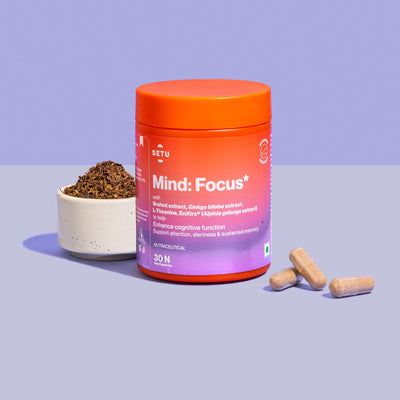What photophobia really means & signs you might have it
30 Aug 2021
Does photophobia mean you’re afraid of having your photograph taken? Not quite, but if you do suffer from the condition, you will be averse to a camera’s bright flash.
The term photophobia literally means a ‘fear of light’. But the ‘fear’ here isn’t the kind you might have of the dark or of ghosts. Rather, it’s a discomfort of or an aversion to bright lights. Read on to understand the meaning of photophobia better and what causes this condition to manifest itself.
What is Photophobia?
A person with this condition experiences an abnormal sensitivity to light. The glare of sunlight or bright indoor lights cab cause discomfort and eye pain (1). This hypersensitivity to light can also lead to headaches, eye aches and excessive blinking. Photophobia is not an eye condition, but a common symptom of many eye- and nerve-related disorders.
The Causes of Photophobia
Let’s take a look at some of the neuro-ophthalmic disorders that cause photophobia:
- Migraine: A person experiencing a migraine on one side of their head will experience light sensitivity along with other symptoms like nausea and numbness of the face. A study conducted by researchers at Korea University College of Medicine found that up to 80% of migraine patients experience photophobia during a migraine attack (2).
- Brain injury: People with mild or traumatic brain injury tend to suffer from light sensitivity. Damage to nerves in the thalamus, the area in your brain that receives and sends sensory-related information, can cause photophobia. A person who has had a brain stroke or meningitis) is also likely to experience light sensitivity.
- Dry eyes: Your eyes feel dry and itchy when they aren’t adequately lubricated, which occurs because of the underproduction of tears by your tear glands. Looking at screens for long hours can also cause your eyes to dry out, as the blue light emanating from them is harmful for your eyes. Light sensitivity is one of the most common symptoms of dry eyes.
- Corneal abrasion: Scratches on the outer protective layer of the cornea affect how the eye reacts to light.
- Eye infections: Sensitivity to bright lights can also be a temporary reaction due to infections in the eye. Conjunctivitis, keratitis or eye allergies can all cause photophobia.
- Mental health disorders: Certain mental health issues like anxiety, depression, panic attacks and bipolar disorder can also make your eyes sensitive to bright lights.
Diagnosis
Think you’re experiencing photophobia symptoms? An eye doctor can clear this up for you and diagnose the underlying cause of your symptoms. The doctor might undertake certain tests like a physical examination of your eyes, MRI scans to check for inflammation or damage to the brain, retina X-rays, blood tests and so on.
Photophobia treatment
Photophobia is only a symptom; to cure it, you will have to first treat the underlying disorder. You can lower your chances of experiencing photophobia or reduce the discomfort you feel by doing the following:
- Avoid bright lights: This is easier said than done, but a few steps like keeping window blinds closed during the day and wearing sunglasses and/or a wide-brimmed hat in the sun can all help you prevent photophobia.
- Eat eye-healthy foods: Foods that are rich in eye vitamins can strengthen your eyes and keep problems at bay, thus lowering your chances of experiencing light sensitivity.
- Eye supplements: It can be difficult to get all the nutrients your eyes need from food. Make up for this deficiency with eye supplements like Setu Eye Max. It contains natural extracts and vitamins that are crucial for eye health. The supplement also protects your eyes from blue light damage, improves your overall vision, and helps fix your sleep cycle.
- Follow other, healthy practices: Get sufficient sleep, take breaks from your screen often, perform eye exercises, and maintain good eye hygiene to prevent infections and irritation.
- Medication: If your photophobia is caused due to factors such as migraine or eye infections, you should visit your doctor and take the appropriate medication to treat the underlying cause.
When should you seek immediate eye care?
You should seek immediate eye care if your eyes become red and/or swollen, your vision becomes blurry, you experience severe headaches or if a foreign body has entered your eyes. Your eyes are a delicate organ, so don’t wait for your symptoms to progress but seek medical care the moment you start experiencing discomfort.
FAQs
1) Can photophobia permanently damage my eyes?
Photophobia is a reaction to light rather than an eye condition and will not permanently damage your eyes. However, the disorder causing this symptom to manifest could be harmful for your eyes, so always seek timely medical attention.
2) What kind of glasses should be worn to prevent light sensitivity?
Specially tinted lenses called FL-41 lenses (3) can help protect your eyes from bright lights. These lenses stop excessive light from entering your eyes, preventing eye strain and excessive blinking.
3) How do I prevent dry eyes if I am exposed to a computer screen for long hours?
If most of your work happens online, give your eyes some rest by looking away from your screen every 20 minutes. You can also soothe and strengthen your eyes by taking nature-based, non-habit-forming eye supplements.

Skin: Renew - Glutathione
- ₹1,494
- ₹1,494
-
₹2,200 -
You Save:
₹706 (32%)
Categories
- Choosing a selection results in a full page refresh.
- Press the space key then arrow keys to make a selection.
this is the sidecart









